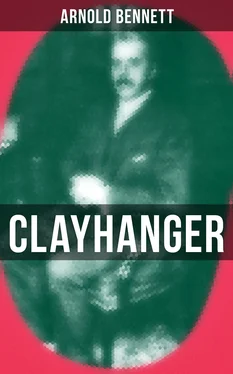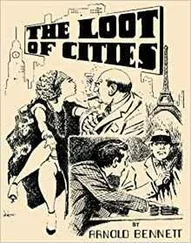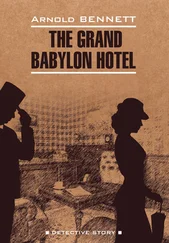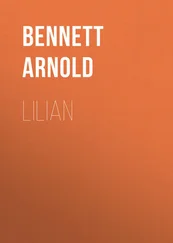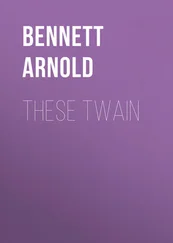Nothing could stop her. The girls loathed these exhibitions. Maggie always looked at the table during their progress, and she felt as though she had done something wrong and was ashamed of it. Clara not merely felt like a criminal—she felt like an unrepentant criminal; she blushed, she glanced nervously about the room, and all the time she repeated steadily in her heart a highly obscene word which she had heard at school. This unspoken word, hurled soundlessly but savagely at her aunt in that innocent heart, afforded much comfort to Clara in the affliction. Even Edwin, who was more lenient in all ways than his sisters, profoundly deplored these moralisings of his aunt. They filled him with a desire to run fast and far, to be alone at sea, or to be deep somewhere in the bosom of the earth. He could not understand this side of his auntie’s individuality. But there was no delivery from Mrs Hamps. The only person who could possibly have delivered them seemed to enjoy the sinister thraldom. Mr Clayhanger listened with appreciative and admiring nods; he appeared to be quite sincere. And Edwin could not understand his father either. “How simple father must be!” he thought vaguely. Whereas Clara fatalistically dismissed her father’s attitude as only one more of the preposterously unreasonable phenomena which she was constantly meeting in life; and she persevered grimly with her obscene word.
“Eh!” said Mrs Hamps enthusiastically, after a trifling pause. “It does me good when I think what a help you’ll be to your father in the business, with that clever head of yours.”
She gazed at him fondly.
Now this was Edwin’s chance. He did not wish to be any help at all to his father in the business. He had other plans for himself He had never mentioned them before, because his father had never talked to him about his future career, apparently assuming that he would go into the business. He had been waiting for his father to begin. “Surely,” he had said to himself “father’s bound to speak to me sometime about what I’m going to do, and when he does I shall just tell him.” But his father never had begun; and by timidity, negligence, and perhaps ill-luck, Edwin had thus arrived at his last day at school with the supreme question not merely unsolved but unattacked. Oh he blamed himself! Any ordinary boy (he thought) would have discussed such a question naturally long ago. After all it was not a crime it was no cause for shame, to wish not to be a printer. Yet he was ashamed! Absurd! He blamed himself. But he also blamed his father. Now, however, in responding to his auntie’s remark, he could remedy all the past by simply and boldly stating that he did not want to follow his father. It would be unpleasant, of course, but the worst shock would be over in a moment, like the drawing of a tooth. He had merely to utter certain words. He must utter them. They were perfectly easy to say, and they were also of the greatest urgency. “I don’t want to be a printer.” He mumbled them over in his mind. “I don’t want to be a printer.” What could it matter to his father whether he was a printer or not? Seconds, minutes, seemed to pass. He knew that if he was so inconceivably craven as to remain silent, his self-respect would never recover from the blow. Then, in response to Mrs Hamps’s prediction about his usefulness to his father in the business, he said, with a false-jaunty, unconvinced, unconvincing air—
“Well, that remains to be seen.”
This was all he could accomplish. It seemed as if he had looked death itself in the face, and drawn away.
“Remains to be seen?” Auntie Clara repeated, with a hint of startled pain, due to this levity.
He was mute. No one suspected, as he sat there, so boyish, wistful, and uneasily squirming, that he was agonised to the very centre of his being. All the time, in his sweating soul, he kept trying to persuade himself: “I’ve given them a hint, anyhow! I’ve given them a hint, anyhow!”
“Them” included everybody at the table.
Mr Clayhanger, completely ignoring Edwin’s reply to his aunt and her somewhat shocked repetition of it, turned suddenly towards his son and said, in a manner friendly but serious, a manner that assumed everything, a manner that begged the question, unconscious even that there was a question—
“I shall be out the better part o’ tomorrow. I want ye to be sure to be in the shop all afternoon—I’ll tell you what for downstairs.” It was characteristic of him thus to make a mystery of business in front of the women.
Edwin felt the net closing about him. Then he thought of one of those ‘posers’ which often present themselves to youths of his age.
“But tomorrow’s Saturday,” he said, perhaps perkily. “What about the Bible class?”
Six months previously a young minister of the Wesleyan Circuit, to whom Heaven had denied both a sense of humour and a sense of honour, had committed the infamy of starting a Bible class for big boys on Saturday afternoons. This outrage had appalled and disgusted the boyhood of Wesleyanism in Bursley. Their afternoon for games, their only fair afternoon in the desert of the week, to be filched from them and used against them for such an odious purpose as a Bible class! Not only Sunday school on Sunday afternoon, but a Bible class on Saturday afternoon! It was incredible. It was unbearable. It was gross tyranny, and nothing else. Nevertheless the young minister had his way, by dint of meanly calling upon parents and invoking their help. The scurvy worm actually got together a class of twelve to fifteen boys, to the end of securing their eternal welfare. And they had to attend the class, though they swore they never would, and they had to sing hymns, and they had to kneel and listen to prayers, and they had to listen to the most intolerable tedium, and to take notes of it. All this, while the sun was shining, or the rain was raining, on fields and streets and open spaces and ponds!
Edwin had been trapped in the snare. His father, after only three words from the young minister, had yielded up his son like a burnt sacrifice— and with a casual nonchalance that utterly confounded Edwin. In vain Edwin had pointed out to his elders that a Saturday afternoon of confinement must be bad for his health. His attention had been directed to his eternal health. In vain he had pointed out that on wet Saturday afternoons he frequently worked at his home-lessons, which therefore might suffer under the regime of a Bible class. His attention had been directed to the peace which passeth understanding. So he had been beaten, and was secretly twitted by Clara as an abject victim. Hence it was with a keen and peculiar feeling of triumph, of hopelessly cornering the inscrutable generation which a few months ago had cornered him, that he demanded, perhaps perkily: “What about the Bible class?”
“There’ll be no more Bible classing,” said his father, with a mild but slightly sardonic smile, as who should say: “I’m ready to make all allowances for youth; but I must get you to understand, as gently as I can, that you can’t keep on going to Bible classes for ever and ever.”
Mrs Hamps said—
“It won’t be as if you were at school. But I do hope you won’t neglect to study your Bible. Eh, but I do hope you’ll always find time for that, to your dying day!”
“Oh—but I say—” Edwin began, and stopped.
He was beaten by the mere effrontery of the replies. His father and his aunt (the latter of whom at any rate was a firm and confessed religionist, who had been responsible for converting Mr Clayhanger from Primitive Methodism to Wesleyan Methodism) did not trouble to defend their new position by argument. They made no effort to reconcile it with their position of a few months back, when the importance of heavenly welfare far exceeded the importance of any conceivable earthly welfare. The fact was that they had no argument. If God took precedence of knowledge and of health, he took precedence of a peddling shop! That was unanswerable.
Читать дальше
